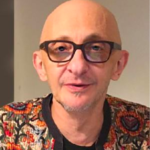Students apply to a specific role on team as follows:
Graphic Design & Video Editing (2 Students)
Preferred Skills: Video editing/video art and or/graphic design skills. Refine current video content, improve sound, cuts and create a stylistic unity with the “Tea Cards” pieces.
Likely Majors/Minors: ARCH, ARTDES, FTVM, SI
Electrical & Software Engineer (2 Students)
Preferred Skills: Help with wireless sensor triggers and software development for an interactive connection between objects, software and video projection. The programming languages needed include ESP32, C/C++, Python, Flask, Socket, React, and HTML/CSS.
Likely Majors/Minors: CE, CS, EE, IOE
Sound Engineer (1 Student)
Preferred Skills: Establish a harmonious agreement between the trigger sounds used at the same time.
Likely Majors/Minors: PAT, SMTD
All team members will work collaboratively.
Faculty Project Lead
 Vadim Besprozvany is a Lecturer at the University of Michigan School of Information. He teaches undergraduate and graduate courses in interaction design, visual design and communications, mentors independent studies in emotional design, animation, branding and identity, and design language. He is an ArtsEngine faculty liaison (UMSI) and is interested in growing intellectual collisions and collaborative practices driven by the arts, design, and engineering. He serves as a curator and consultant at the Odesa Contemporary ArtsMuseum (MSIO, Ukraine), and participates in art(co)archive initiative, which is dedicated to Ukrainian contemporary art. Besprozvany’s primary research areas include visual rhetoric, semiotics, media, cultural studies, and communications theory. He received his B.A./M.A.from Tartu University, Estonia, and Ph.D. from the University of Michigan.
Vadim Besprozvany is a Lecturer at the University of Michigan School of Information. He teaches undergraduate and graduate courses in interaction design, visual design and communications, mentors independent studies in emotional design, animation, branding and identity, and design language. He is an ArtsEngine faculty liaison (UMSI) and is interested in growing intellectual collisions and collaborative practices driven by the arts, design, and engineering. He serves as a curator and consultant at the Odesa Contemporary ArtsMuseum (MSIO, Ukraine), and participates in art(co)archive initiative, which is dedicated to Ukrainian contemporary art. Besprozvany’s primary research areas include visual rhetoric, semiotics, media, cultural studies, and communications theory. He received his B.A./M.A.from Tartu University, Estonia, and Ph.D. from the University of Michigan.
Students: 5
Likely Majors/Minors: ARCH, ARTDES, CE, CS, EE, FTVM, IOE, PAT, SMTD, SI
Meeting Details: Fridays, 4-6pm
Application: This project requires applicants to include link(s) to your portfolio, work samples, or other website(s) in the personal statement portion of your application to share work you would like considered as part of your submission.
Summer Opportunity: Summer research fellowships may be available for qualifying students.
Citizenship Requirements: This project is open to all students on campus.
IP/NDA: Students who successfully match to this project team will be required to sign an Intellectual Property (IP) Agreement prior to participation.
Course Substitutions: CoE Honors

